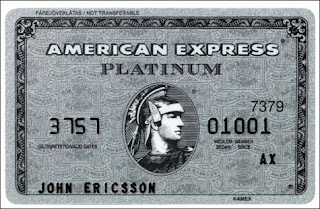
It will be interesting to see the direction of AXP and COF over the next couple of months. With unemployment increasing at historic rates, to 8.5% at the end of March, it will be interesting to see the default rates at the various credit card companies.
Obviously, the market thinks they losses will be extremely painful. AXP is down 66% over the past 5 years and down 56% over the past 10 years. COF is down 81% over 5 years, or 73% over the last decade (ouch).
This does not include Visa and Master Card, which of course do not have credit exposure, just swipe exposure, which I like to call it, refers to the amount of useage of the Visa and Mastercard customer and how many times the cusomter uses the card and the amount of his or her purchases. They do not extend credit lines to consumers. And they are glad they do not.
On the other hand, AXP and COF do extend credit lines. AXP increased the amount of their credit exposure over the last couple of years, before the onslaught of the credit storm. This, horribly timed decision has come back to bite AXP, and will continue to harm them as unemployment spikes. Which it likely will, based off the reports of economists.
Capital One, recently had their credit rating affirmed, but their outlook was revised to negative continuing forward. Clearly the credit rating agencies have had a rough couple of years, lowering their credibility for the foreseeable future, but it looks like they stated the obvious lowering their outlook to negative. The stock inreased 5% on the news of the outlook, largely reflecting a sign of relief in the affirmation of the ratings, but also indicating the obvious nature of the Fitch credit call. Everyone knew this was coming, and it was largely seen as inevitable.
AXP largely relied on high end customers to support their profits, however, as stated, in recent years as growth slowed, they tried to move into the large end market to charge higher rates and spread the awareness of their brand. Without this move, they would not be sweating the bullets as they will over the next year or two. Largely a reflection of this is Warren Buffet's failure in recent months to increase his position in American Express. This might be because of an agreement with the company to not increase his position past a certain threshold, however, given the nature of the market, they company would likely waive this provision (if it exists) to allow Warren Buffet to show the market his confidence in AXP.
An investment in AXP would easily increase the confidence of the company and be a signal to investors that AXP is a bargain at these levels. To this date in April, WB has not added to his position and is silent on all matters relating to AXP.
In a surprising annoucement, AXP recently voted to maintain their dividend at 18 cents a share. With the large financial conglomerates reducing their dividends, BAC, C, WFC, USB and others, it was a welcomed surprise to investors. However, how prudent that decision will prove to be, has not be determined. In today's envrionment, it is almost foolish to not cut the dividend, because as many companies have stated, earnings predictions are unclear.
Obviously, the decision to maintain the dividend was a reflection of the board's need to instill confidence, protect the stock price, and to show the quality of their brand. With the yield currently at around 5%, they had plenty of room to cut the dividend and still provide income to long term investors.
The common rule of thumb for credit card losses, is that each 1% percentage uptick in unemployment equals 1% in credit losses. With unemployment expected to reach close to 10% (most economists predicting 9.5%), credit card companies and banks likely have a lot of pain left to report. Maybe, they will be helped by the new FASB rules on Market to Market accounting.



No comments:
Post a Comment